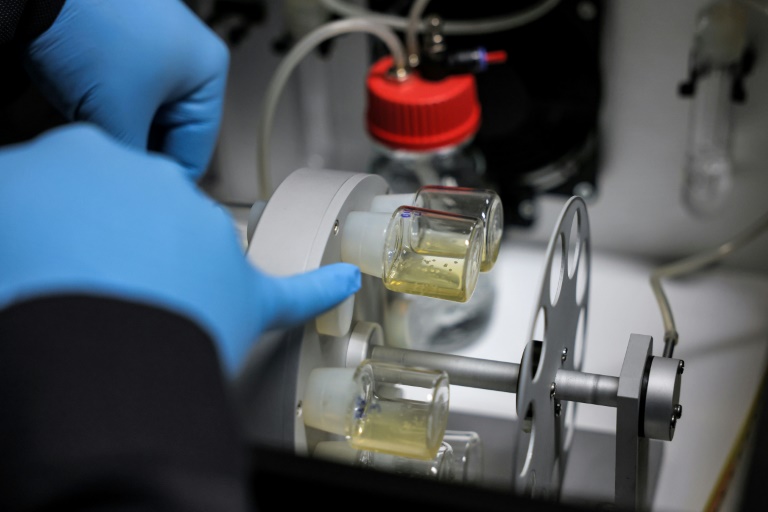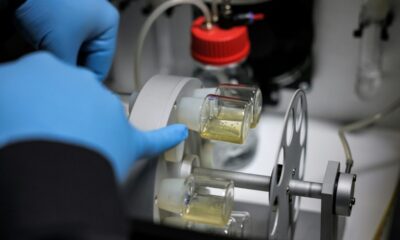Science
Minovia Therapeutics Advances Mitochondrial Therapy for Rare Diseases

Recent advancements in mitochondrial therapy are showing promise for treating diseases linked to mitochondrial dysfunction, which affects numerous bodily systems. One notable player in this field is Minovia Therapeutics, led by Dr. Natalie Yivgi-Ohana, Co-Founder and CEO. The biotechnology company, established in 2012, focuses on innovative therapies aimed at restoring mitochondrial function, a crucial factor in conditions ranging from neurodegeneration to metabolic disorders.
Minovia’s lead product, MNV-201, utilizes the company’s proprietary Mitochondrial Augmentation Technology (MAT) to infuse healthy mitochondria into a patient’s own stem cells. This approach aims to improve organ function and overall health. Currently, MNV-201 is undergoing a Phase 2 clinical study targeting Pearson Syndrome, a rare pediatric disease, alongside a Phase 1b study for low-risk Myelodysplastic Syndrome (MDS), a blood disorder primarily affecting older adults.
Targeting Mitochondrial Dysfunction
The urgency to address mitochondrial dysfunction is underscored by the potential impact of this research on rare diseases like Pearson Syndrome and MDS. Dr. Yivgi-Ohana explained that Minovia initially explored direct mitochondrial injection in preclinical models, focusing on critical limb ischemia. However, regulatory challenges led them to pivot towards an ex-vivo therapy approach. In this process, hematopoietic stem cells are collected from patients, enriched with placental mitochondria, and then reinfused.
Dr. Yivgi-Ohana emphasized the importance of beginning with rare genetic diseases to establish safety and efficacy. “We believed this would pave the path forward to treat other, more common diseases,” she stated. The company is also developing blood-based biomarkers to identify patients with mitochondrial dysfunction, validated initially in Pearson and MDS patients.
Potential for Longevity and Aging
The implications of Minovia’s therapy extend beyond rare diseases. Given that mitochondrial dysfunction is a significant hallmark of aging, there is growing interest in its potential applications for longevity. Preliminary studies have shown promising results, including improved mitochondrial function in aging mice, which experienced enhanced mobility and a rejuvenated kidney phenotype after treatment.
In human patients with genetic mitochondrial diseases, MAT has demonstrated improvements in blood mitochondrial function, muscle strength, and cognitive abilities. In collaboration with Dr. Omar Abdel Wahab at Memorial Sloan Kettering Cancer Center, research indicated that MAT could delay the progression of Acute Myeloid Leukemia and enhance survival rates in animal models.
Recent Clinical Milestones and Future Goals
Minovia Therapeutics has reached significant milestones in its clinical trials. The Phase 2 trial for MNV-201 in Pearson Syndrome, conducted in Israel, has already seen four of six patients dosed, with preliminary safety and efficacy signals emerging. The U.S. Food and Drug Administration (FDA) has granted Fast Track Designation for both Pearson Syndrome and MDS, with the latter also receiving Rare Pediatric Disease Designation. These designations are critical, allowing for streamlined processes that could expedite time to market for this much-needed therapy.
Dr. Yivgi-Ohana noted, “Both of these designations validate the clinical approach while acknowledging the urgent need for new treatment options.” Additionally, Minovia’s drug candidates have been utilized in compassionate use programs, showing clinical improvement in patients with Kearns-Sayre Syndrome and Leigh Syndrome.
Looking ahead, Minovia plans to expand its presence in the United States, opening clinical sites for both Pearson Syndrome and MDS, while also partnering with global longevity and regenerative medicine clinics. “We can’t wait to see our technology make a real difference for patients,” Dr. Yivgi-Ohana expressed.
As research progresses, Minovia Therapeutics stands at the forefront of a new era in mitochondrial therapy, with the potential to transform treatment options for a variety of diseases and age-related conditions.
-

 Politics4 weeks ago
Politics4 weeks agoSecwepemc First Nation Seeks Aboriginal Title Over Kamloops Area
-

 World5 months ago
World5 months agoScientists Unearth Ancient Antarctic Ice to Unlock Climate Secrets
-

 Entertainment5 months ago
Entertainment5 months agoTrump and McCormick to Announce $70 Billion Energy Investments
-

 Science5 months ago
Science5 months agoFour Astronauts Return to Earth After International Space Station Mission
-

 Lifestyle5 months ago
Lifestyle5 months agoTransLink Launches Food Truck Program to Boost Revenue in Vancouver
-

 Technology3 months ago
Technology3 months agoApple Notes Enhances Functionality with Markdown Support in macOS 26
-

 Lifestyle3 months ago
Lifestyle3 months agoManitoba’s Burger Champion Shines Again Amid Dining Innovations
-

 Top Stories2 months ago
Top Stories2 months agoUrgent Update: Fatal Crash on Highway 99 Claims Life of Pitt Meadows Man
-

 Politics4 months ago
Politics4 months agoUkrainian Tennis Star Elina Svitolina Faces Death Threats Online
-

 Sports5 months ago
Sports5 months agoSearch Underway for Missing Hunter Amid Hokkaido Bear Emergency
-

 Politics5 months ago
Politics5 months agoCarney Engages First Nations Leaders at Development Law Summit
-

 Technology5 months ago
Technology5 months agoFrosthaven Launches Early Access on July 31, 2025













